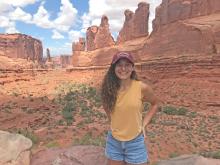These past two years have seen unprecedented success for a number of our history graduate students, many of whom were awarded some of the country’s most competitive and prestigious fellowships: two Fulbright fellowships, two Ford fellowships, a Society of Scholars fellowship, and a Social Science Research Council fellowship.
One of these scholars, Sierra Mondragón, who is a first-year doctoral student studying Indigenous history, received a three-year predoctoral Ford Foundation fellowship. We sat down with Sierra to learn more about her, her research, and how she managed to receive such an impressive fellowship in her first year at the UW.
Q: Tell me a little about yourself. How did you end up studying history?
A: I’m from Northern New Mexico and I’m of mixed Pueblo and Chicanx descent and my family are enrolled members of Nanbé Owingeh Pueblo and mixed Chicanx. I went to undergraduate at Swarthmore College, and it was my first real time away from home and my first time on the East Coast. I initially thought I was going to focus on English and STEM, but my history professors really blew me away with their teaching. I took an early US History course and a course titled “Black Women and the Civil Rights Movement,” and I soon realized how much had been left out of my high school history classes. Once I realized that history was being written about people I care about—women, and especially women of color—I realized I really wanted to study history.
Q: And how did you end up at the UW?
A: Initially it was just luck. I was part of the IRT [Institute for Recruitment of Teachers] program which covers the application cost for some graduate school applications. I first looked into UW because it was one of the programs covered! Then I realized that Professor Josh Reid was part of the department, and he was exactly the type of mentor I wanted. Having Dr. Bianca Dang [one of the history department’s newest faculty members] as my second advisor was also a huge draw. I had been desperately missing and wanting to have Indigenous professors, and I knew Josh Reid would be the best and would help mentor me in community-based research. Also, the opportunity to learn from Dian Million [American Indian Studies faculty at the UW] was a huge deal for me. She is one of the most crucial leaders in the field of Native feminisms! These people were like rock stars, and it really made me want to come to UW! I also loved how UW had a strong culture of mentorship and community.
Q: Now that you’re here, what is your research focusing on?
A: I focus on Indigenous women’s history, and I’m particularly invested in how Indigenous women use their own lived experience to create strategies and activism to confront ongoing colonial violence from early colonialism through the 20th century. I want to see how lived experiences can explore the roots of colonial violence, but also resistance, healing, and Indigenous futures.
Q: And how does your own background inform your work?
A: Coming from a mixed racial and mixed ethnic background, as well as a public school education, has really impacted my work. I not only have a lot of stake in making education accessible, but I have a lot of stake in becoming a transformative and compassionate researcher and teacher, especially for students from marginalized backgrounds. That has been really critical for me because it’s my professors who have provided me with consistent support and guidance. I want to be that professor for other people like me.
Q: And what about the Ford Fellowship? How does it feel to get such an incredible three-year award?
A: Well it’s the last year they’re doing this fellowship, so it really felt like a big deal. One of the huge draws was the financial support for three years, which will allow me to focus on my research. The networking is also a big bonus, there’s a huge community of Ford fellows, and the Ford conference is a really special chance to meet them. The goal of the fellowship is to diversify higher education and support people who are going to become professors who are going to support social justice. And I am so thankful to Dr. Josh Reid, Dr. Bianca Dang, Dr. Chandan Reddy, Dr. Ileana Rodríguez-Silva, and Dr. Bruce Dorsey, who supported me through the application process.
Q: Finally, what do you hope to achieve in your work?
A: If I become a professor and can help even one student in the way I was helped it would be worth it. My family and I have had our own experiences with different forms of violence. In undergraduate I was enduring intimate partner violence while being far away from home for the first time and in a predominately white institution—my work became a lifeline for me and key in my own personal healing. My work is very emotional, and it’s always going to be very personal. I’m constantly asking the question of how can the work I do help my community and the communities where the people I Iove are from. I want to put more compassion and people back into history, especially Indigenous history.
Outside of academia, Sierra enjoys reading, spending time with family and friends, travel, and arts and crafts. She loves the easy access to nature in Seattle, the abundance of amazing food, and living around mountains, which reminds her of her home in New Mexico.
